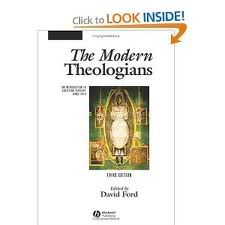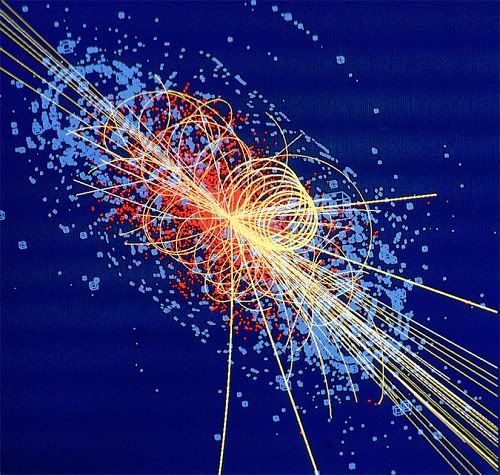
Atheists such as Dawkins often argue that a complex creation such as the universe (or the Multiverse) requires a complex creator. If the creator is complex, these clever people think, then the odds of "him" existing are much less and so God is improbable. It would hysterical to hear what Kierkegaard would say, probably something like, "sure God is improbable, there's no better proof he's real." Aside from the ridiculous idea of attaching a probability to the likelihood of the basis of all that is existing, the atheist's point is to counter the design argument. Of course to make the argument they must assume God is like a big man in the sky rather than the ground of being.
Tillich argues that this big man in the sky is behind much atheism. It is an anecdotal observation that now seems to be backed up by some emerging data. It is certainly the case that atheists are embroiled in a struggle against the superego-like God whom they think of as a “big man in the sky.” Nothing is clearer for that than Dawkin’s approach to the reverse design arguments. In answering God arguments Dawkins takes God as totally a being alongside other beings and in fact seems to think he is perfectly, 1x1, analogous to a biological organism.[1] Dawkins spells it out in no uncertain terms. “why there almost certainly is no God.” Why? Because, a big man in the sky would have to be more complex than the universe he creates. Of course this is based upon the assumption that whatever reality entails has to reflect accurately and be limited to the information we glean from our little dust mote, from which we have never journeyed far.[2]
Dawkins is working against what he takes to be the most popular pro God arguments (one of the weakest) the monkey’s-writing-Shakespeare-by-accident argument. He couches it in terms of assembling a 747 from a scrap yard by means of a hurricane. [3] The creationist, whose argument this revises, couches his argument in terms of finding some living creature who is too improbable to be assumabled by accident. Improbability means complexity. The more complex something is the less likely it is to be assembled by accident. The creationist equates improbability with design. Dawkins points out that it’s not the Darwinians who are trying to get “something for nothing,” so to speak, in assuming that complexity could come about undersigned, but the creationists are seeking the “free lunch,” simply because they don’t recognize that “however statistically improbable the entity you seek to explain by evoking a designer, the designer himself has got to be at least as improbable. God is the ultimate Boeing 747.”[4] Dawkins takes this assumption through the entire book. The view of God that he’s attacking is obviously that of a big man. It may be couched as “big mind” or even “universal mind” but it’s still an entity, a thing, something that has to consciously calculate or deliberate about what it’s doing. Never does he stop to consider that he might have the wrong idea of God. He spends long pages droning on and on about consciousness raising and implying that creationists are stupid and feminists are smarter,[5] never does it occur to him that he just might be dealing with the wrong concept of God.
On the other hand, we can’t understand God as impersonal force like the electro-magnetic or the strong force that would reduce God to being “a thing.” That would place God under the regime of being rather than understanding God as the foundation of being. There are a couple of good reasons not to do that. The depth of being is certainly one such reason. We know that being has depth then the basis of being can’t be just another thing like an impersonal force. The complexity argument is stupid, because it equates complexity with probability. The ground of being can’t be merely probable, either there’s a ground of being or there is not. If not then there can’t be any depth of being either. If there is depth there is a ground, and if there is a ground it can’t be just another thing. There has to be alternative to the stark contrast between “personal” in the sense of human consciousness and impersonal in the sense of dead matter. The stark choice between being en soir and por soir[6] is really limited. There has to be some other aspect of being that is either both or neither, or perhaps both and neither. To find the solution to the personal problem we probably have to venture away from the confines of Tillich’s theology, since he never considers the need to understand God as personal. Perhaps the major reason, however, to understand God as “personal” is because most mystics experience God in this way. The sense of the numinous is the most profound mystical experience next to the undifferentiated unity and is certainly as prevalent if not more so. This experience, the sense of the numinous is a deep all pervasive sense of love emanating form everything and love for everything, and most especially love for people. Love itself demands the personal.
Mystical experiences can be divided into two types, the introvertive and the extrovertive. Researchers are divided as to which of these two experiences is the most advanced. Introvertive is impersonal; all sense of differentiation in reality is lost. This state is supposed to be beyond word, thought or image. The extrovertive experience transfers the unity to nature. One distinguishes between different objects but an underlying sense of unity pervades all. In contrast to these two experiences, which are perhaps different stages of the same thing, there is also another kind of mystical experience called ‘the numinous.” This experience is derived from the work of Rudolph Otto and his sense of the holy.[7] The numinous is an experience of personal dimension in the divine. It is a sense of all pervasive presence, usually a presence of love. In this experience one usually sees God as personal and loving. Both of these experiences are properly mystical. “Although it is possible to separate the numinous and mystical as two poles of religious experience, they are ultimately united, mystical experiences of unity (variously expressed) can be numinous as well.”[8] One could proceed on the assumption that the personal is the illusion and fades away when the mystic gains more advancement. That doesn’t really seem to be what the research shows. It seems more like a matter of which aspect one emphasizes they are actually two poles of the same thing.
Thus we can separate the numinous and the mystical for conceptual purposes, depending upon whether the personal or impersonal aspects of foundational reality are emphasized. Mysticism tends toward the impersonal and numinous tends toward the personal. As we shall shortly note measurement studies can identify both numinous and mystical experiences, based upon whether one experiences a sense of presence (numinous experience) or a sense of unity (mystical experience)…that both components are properly mystical has been briefly noted above and extensively argued by Hood…their importance is that from a social psychological perspective they are part of what religions defend as the experience of the sacred.[9]
In other words we can’t write off the personal dimension as the illusory any more than we can the other pole of the unity. They are both intrinsic to the foundational nature of religious belief.
Mystical experience is seen by many as the actual basis of religion and the ground of the mature end of Christian experience. Religion is more than merely “jumped up” ethics, or primitive failed science. There is a core to all religious belief that is rooted in the sense of the numinous, the idea that something special, something “holy” is set apart from the mundane world. That in itself introduces an experiential dimension into the concept of the religious. That differs markedly from the "big sky guy," who is merely amplified humanity. The atheist makes the analogy to humanity based upon this well wore cliche of God probably becuase it's most people are introduced to. That's a necessary hazard of human thought, in seeking to illustrate God's love it's only natural to compare God tot he most loving things we know, mother and father. Then when we do that we also open our God images up to the most negative and frustrating relationships we know, for those of us not had blessed with a loving postoperative home. Moreover, all people have friction with parents and problems with super-ego, so that just equates God with problems. There's really no other way around it, we just have to keep in mind that the "father image" is a metaphor.
CARM 2/20/11, no 10 in thread
Originally Posted by HRG View Post
But the argument is algorithmic, not biological. "Complex" means able to plan and store a large amount of information. In any case, if you are not composed of parts, you cannot store information. Each bit needs a specific part where it goes, and different bits need different parts.That would only be true if you limited to biological or physical nature. He's still trying to compare God to things in the world. God would have to be complex to plan, that's only true if you are a big man not if you are the ground of being. Is it true that God actually plans? No more so than it is that God actaully calculates. Why would "he" need to do either? I think part of the problem with athesits is that they just have no imagination. They just can't conceive of something that challenges their scientific learning.
HRG:
P.S. The author of the answer you quoted does not understand Dawkins' argument and present just the often rebutted fallacies of Scholastic theology.I'll quote the source he refers to in a movement. This is truly a lame response. He doesn't understand: crank up the irony meter. The arrogant Austrian mathematician goes on his way really believing he's socked to my argument by reinforcing a inept comparison and not understanding the concept of ground of being.
doesn't matter. there's no comparison to the ground of being so there' no point in using the term. "complex" in relation to what?
My understanding of scinece is complex compared to my one year old great niece's understanding. My understanding is, according to HRG, simple compared to his understanding. What if I was the only human being ever to do scinece in a thousand years, would my understanding be complex or simple? you can't even say it without comparing it to something. One cannot say "it would be complex" without thinking "compared to the lack of any scientific thinking for a thousand years."
the source to which he refers is a blog that ceased publication in 2007, unfortunately because it was by someone I don't know but someone who understand the basic concepts of the Christian God, rooted in the history of the chruch; extremely rare.
Deeper Waters
Dawkins should know that in Christian thought, God in his nature is immaterial. What parts does he think he can speak of then? Do such questions even occur to him? One cannot know because Dawkins simply does not interact with his opponents. Evolutionists prefer to not argue when all their opponents simply get their arguments only from YEC materials. Fair enough. (To those who are YEC, I do recommend reading all materials so you can have an idea of what your opponents believe and why. I have met a number of YECs who unfortunately think being YEC means denying inerrancy and a literal Adam and Eve.) However, Dawkins seems to get all his information secondhand, as if he was reading it off of Wikipedia, which would make a lot of sense.I urge the reader to read the entire piece as it is worth reading. Here is a summary of my answers to the issue:
What do I mean however by God being simple then? I dare not simply say Dawkins has it wrong without entering my own information in. I mean that God is not made up of parts. There is no combination in him. For instance, I as a human being possess a human nature that is tied to this material that I dwell in. Both of these also have existence. They do not existence necessarily but have a derived existence.
An angel is different. Now to my atheist friends, even if you do not believe in angels, Aquinas does. His argument does not depend on their existence, but it shows his way of thinking and it does not refute his point to say “There are no angels.” An angel is an immaterial being, but it does not have necessary existence. It too has derived existence. Angels are not separated by matter seeing as they’re immaterial, so they differ by essence. Each angel is his own essence. Therefore, an angel has an essence with no matter. It is purely essence plus the existence it receives. In this, it’s essence is simple as it has no parts, but it is not absolutely simple in that it has essence plus existence.
However, God has his essence AS his existence. What it means to be is God. God is being without limitations. Of course, Aquinas works this out further, but it means there is no combination in God. It also means His existence is not caused as what can cause existence? Something outside of existence? Then this non-existing thing is acting to cause existence, which is absurd. Is it another existing thing? There cannot be two such beings for there is nothing they would differ by and if two things differ by nothing, they are the same.
Anyone who has studied Aquinas briefly would know that Dawkins fumbled entirely on this one, and the shame is that these are the first arguments Dawkins attempts to refute. Even if one is an atheist, one should accept that Aquinas was a brilliant mind and that he reasoned out his arguments well. That does not mean they’re right, but that does mean one should take them seriously and not write them off hastily.
If any atheist uses this kind of argument, you can rest assured you are talking to a neophyte in the area of theology who does not understand the concepts he argues against. It is the shoddy research of the new atheists in this manner that further to me realize the bankruptcy of their position. It is simply outrage against a belief system they have not taken the time to understand. Sadly, this comes from the people who are supposedly the beacons of reason.
(1) the argument that the cause of a complex effect must be complex is still a violation of evolution. By "violation" I mean a contradiction.
(2) Ditto contradicts unified field.
(3) there is sense in using terms like "complex" or simple of God because there's nothing to compare God to other than his creation. This may mean Aquinas is wrong to call God "simple" but I think not because he's speaking in a certain sense. ie God is not made of parts.
(4) "Complex" in relation to biology means parts. God is not made of parts.
Sure God is antisocially complex but that is not the sense in which Dawkins et al assume
[1] Richard Dawkins, The God Delusion, op cit (chapter 1 fn 5) on line page 138. all of these references are on line page numbers.
[2] Ibid, 138
[3] Ibid. he attributes the scrap yard image to Fred Hoyle.
[4] Ibid, 138
[5] 189-140
[6] en soir = “being in itself.” Por Soir = being for itself. These are terms used by Jean-Paul Sartre in his Being and Nothingness. The “being in itself” refers to inanimate objects and being for itself refers to conscious being. Jean-Paul Sartre, Being and Nothingness, New York:Hazel E Barnes Philosophical Library, 1948m 1943
[7] Ralph Hood, Spilka et al, op cit 292
[8] Ibid.
[9] Ibid, 293







